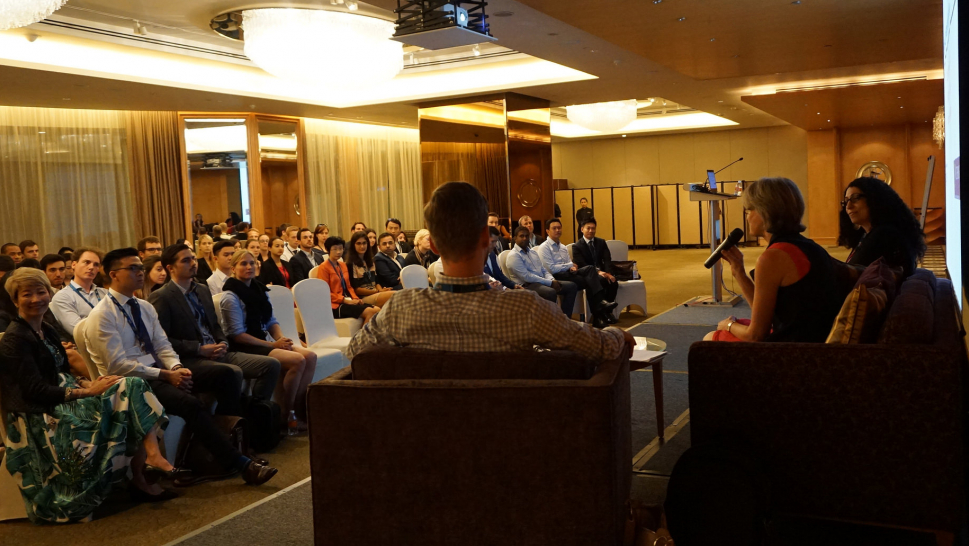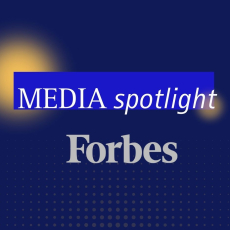The meeting kicked off with a welcome address from Dr. Jumana Zahalka, Assistant Dean and Senior Lecturer as well as the Academic Director, MSc (Mgt) CEMS MIM at the NUS Business School. “NUS is a leading global university centred in Asia, influencing the future, creating distinctive value. This is evident through the numerous academic collaborations with partner institutions all around the world. We are therefore very pleased to be a member of the vibrant CEMS Global Alliance. CEMS enables our students to obtain profoundly diverse academic and professional experiences at the top 30 Business Schools in 30 countries spread across the globe, all with ongoing contributions from CEMS’ numerous corporate and NGO partners. Moreover, NUS Business School also hosts CEMS Alliance Academic Member students, thus ensuring that we also benefit from the animated idea generation that arises from the collaboration of diverse cultures and experiences,” says Zahalka.
Her address was followed by a presentation of CEMS to companies interested in becoming Corporate Partners who were attending the Thursday evening event, by Nicole de Fontaines, CEMS General Secretary. “CEMS now counts seven academic members in the Asia Pacific region. It is a region of strategic importance for CEMS and for both Asian and European-based corporate partners who are keen to attract and recruit CEMS profiles for jobs there. We are extremely pleased to organise this event in Singapore, a major economic hub and at NUS which is a major player in Asia Pacific,” adds de Fontaines.
The presentations were followed by a talk given by CEMS alumnus Jacek Pyrzak, who is the Regional Category Buyer in Asia-Pacific for the Kerry Group, on his experiences as a CEMS alumnus. Following the talk, there was an opportunity for CEMS students and alumni in the region to network with companies looking for talent in the region. “Personally, I find the networking sessions especially useful. It is definitely more insightful than reading on company websites because by speaking/ interacting with employees from the company itself, I was able to get a glimpse of the company culture and whether the company would be suitable for me or I would be suitable for the company. I am also very grateful for the opportunity to speak to senior management because you don't get such opportunity very often and there is so much to learn from their experiences and insights,” says CEMS student Jeeyen Leem.
Leading the second day of the Benchmarking meeting was a fascinating presentation by the Human Capital Leadership Institute on “Leadership Mosaics Across Asia” by Rebecca Siow, Head of Research at HCLI. She showcased, for example, the natural tendency for people from India to be more able to make sense out of chaos, while in other parts of Asia, this might be quite difficult, given the trend towards a more structured approach. Siow’s main point was that “to support leaders in Asia to their fullest potential, we must understand the leadership style nuances between cultures.” The full publication will be available 12 October via HQ Asia website: http://hqasia.org/current-initiatives/leadership-mosaics-across-asia.
This was followed by a great discussion between Micaela Saeftal, Head of Global Trainee Programme at ABB; Elisa Wong, Vice President, Human Resources, Hiltia Asia; and Antonio Martinez, CEMS Alumnus and VP Head of Internal Audit at DKSH moderated by Chung Yuen Kay, Adjunct Associate Professor at NUS Business School on the topic of Managing Cultural Diversity in the Workplace. For Pr. Yuen Kay, it was interesting to hear about the practices that companies like ABB and Hilti actually have in place to foster inclusivity and engender intercultural understanding. Also, the cut and thrust of some of the discussion brought home the point that there is no ‘one way’ for managing the CD – it goes beyond ‘politically correct’ pronouncements. Martinez recognized for him that, in managing culture, it is important to recognize and build on the commonalities and negotiate the differences, but at the end of the day, it’s about getting the work done.
On the talent requirements of the global supply chain hub, Thomas Holenia, Managing Director of the global supply chain hub in Singapore and President of Henkel Singapore, highlighted in his presentation that having an international team is a must, and a key aspect is making the transition as smooth as possible for those undertaking international assignments. He said that the most important thing is to help the person integrate, for example, by assigning a buddy from the host country and through language and inter-cultural training.
Ailin Yang, Director of Recruitment and Development, APAC, for Education First showcased in their company, they are in the business of diversity, highlighting the fact that the company doesn’t even have a corporate Headquarters. Their main focus is on recognizing the main qualities of those who are succeeding in the company and recruit for these skills. For EF, that means looking at recruiting students from INSEAD and CEMS.
After exploring the issues around diversity, MetLife’s Innovation Centre Head of Learning & Culture Change at LumenLab showcased how they leveraged diversity for creative thinking and effective innovation. He made the case for innovation centers to be free from the rigors of corporate structure to allow creative thought, and yet the necessity for the two entities to collaborate to create growth engines for the larger companies. He also insisted on not getting too tied down to the solution to a problem in the development process, but remain focused on the problem you are trying to solve for the company.
The event closed with a short testimonial from Hilti on the successful partnership with CEMS and some closing words by de Fontaine. “Cultural diversity is at the core of CEMS’ DNA. Our students and alumni are recognised for their cross-cultural abilities, their curiosity and adaptability. CEMS creates bridges between its stakeholders and their respective approaches and cultures. In particular, the dialogue between academic and corporate partners certainly explains CEMS’ long lasting success,” concludes de Fontaines.




